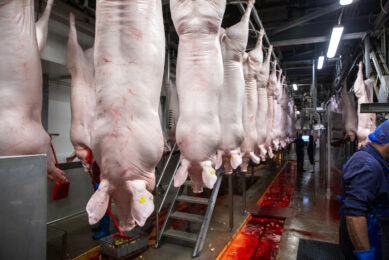Promising trials for new PCV vaccine

Scientists at Kansas University say that vaccination studies, aimed at creating a Porcine Circovirus-2 vaccine, seem to look promising.
“It’s too early to tell how effective this vaccine will be, but the preliminary trials look good,” said Lisa Tokach, an Abilene, Kansas-based veterinarian.
The studies are expected to be completed in about a month. The scientists are not sure when a vaccine will be available in sufficient amounts for producers to purchase.
Different strains
According to Raymond Rowland, PhD, a virologist at Kansas State, different strains of PVC2 have now been identified – one of them being lethal.
The research is the result of an intense collaboration between pig producers, veterinarians and scientists across the USA – working together to find a solution quickly.
The outbreaks, caused by Porcine Circovirus-2, were first discovered in November 2005 and showing new cases almost every week. Some producers are said to have lost about 20% of their finishing herd.
Infection rate
It is predicted that every US pig herd is ‘infected’ with PCV Associated Disease (PCVAD), however, not all herds are ‘affected’.
Environmental conditions and the presence of other pathogens or diseases may be contributing factors explaining the difference between infected and affected herds.
PCVAD depletes the lymph node system, leaving the pig with no defense against other pathogens.
Grants
Kansas State received about $70,000 in research grants from the National Pork Board and from agriculture experiment station funding.
Symptoms of PCVAD include anorexia, rapid weight loss, generally unhealthy pigs, skin discoloration or lesions, respiratory problems and diarrhoea.
Related website:
• Kansas State University
For the latest pig news, subscribe here











